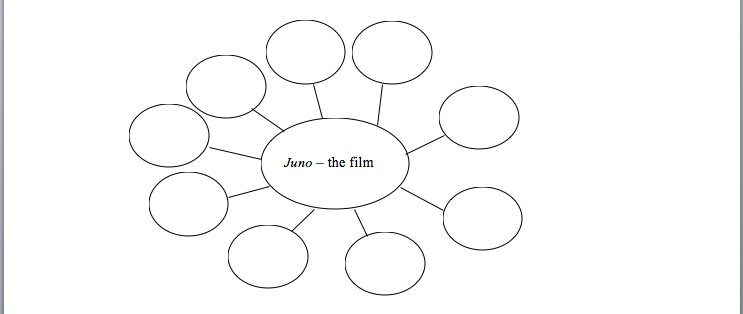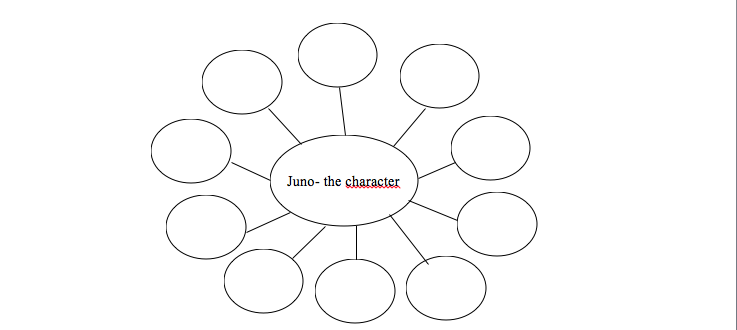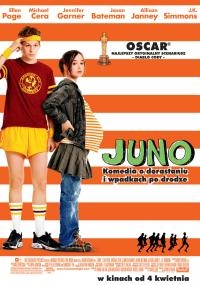Juno – an usual teenager?
Nina Śrutek, Karolina Kucharczyk
Cele lekcji
After the lesson the students should be able to:
• know the plot of the film
• analyze the film as a whole
• concentrate on certain parts of the film, notice recurring motifs
• describe and understand the characters, their behaviour
• know the names and briefly describe main characters
• recognize the main problem presented in the film
• recognize and understand the following notions: sexual subjectivity vs sexual objectivity of women, the difference between perceptions of a girl and a boy in sex situations, stereotypical parental roles and stereotypical teenager roles in relation to sex.
Czas pracy90 minutes – screening time | 90 minutes – the lesson Środki dydaktyczne• The movie „Juno” • Worksheets prepared by the teacher |
Formy pracy• Group work • Pair work Metody pracy• Brainstorm • Film analysis • Discussion |
Przebieg lekcji
1. Brainstorm
The teacher draws a graph on the white board. In the middle she/he writes Juno- the film. Then, the class is asked to come up with their ideas for what the film is about. The students brainstorm their ideas and the teacher fills in the graph with their ideas. Next, they all look at the graph and try to justify their choices, supporting them with certain arguments in connection to the movie scenes. As a second part of the exercise, the teacher draws a second graph and signs it ‚Juno- the character.’ The students are again asked to brainstorm, but this time, for the characteristics and features they found in Juno while watching the film. The teacher writes everything on the graph, and then the choices are discussed and justified.
The teacher asks the following question: do you find Juno a positive or a negative character? Why?
2. Answer the questions
The teacher divides the students into bigger groups and asks them to answer the questions provided on the worksheet. At the end, groups present their answers.
As the next step, the film analysis is conducted. Basing on the questions just answered, the teacher asks the students about the significance of certain moments and scenes, as well as about the significance of some recurring motifs. There is an open class discussion.
3. Discussion – Teen Pregnancy- does it or should it concern us?
The teacher presents some important notions to the class. Firstly, without explaining them thoroughly. The teacher divides the students into pairs and asks the following question: If you were to guess, just by the intuition, what the notions mean, how would you explain them to your peers? The students present their answers, the teacher comments on them, adds something more, or explains thoroughly if necessary.
The teacher initiates the discussion about teen pregnancy and girls’ figures. The teacher mentions the fact that it is a difficult and very personal topic. However, talking about it should not be considered as something strange or shameful. The teacher applies real life contexts and moves some part of the discussion onto the Polish background.
Answer the questions:
1. What is your general impression about the film? What feelings did it evoke? What was your first impression of the opening scene?
2. Which character is your favourite? Why?
3. How would you judge Juno’s reaction when she realizes she is pregnant?
4. How would you judge Bleeker’s reaction to the news about Juno’s pregnancy? Do you find it proper? Is he willing to take responsibility for the child or is he rather passive? Think of motives behind both „parents” decisions.
5. What do you think about Juno’s parents’ reaction to her being pregnant? Are they helpful? Do they judge her anyhow? What do they do?
6. How would you interpret the characters of Vanessa and Mark? Do the characters have some special significance for the whole movie or for Juno?
7. Do you think Mark has any contribution to Juno’s growing up?
8. Do you think Juno grows up thanks to the pregnancy or is she still a child even after giving birth?
9. How does Juno realize she loves Bleeker?
10. Why is Juno’s name Juno?
11. Do you find Juno’s decision about finding adoption family for her child right? Is it reasonable or is it rather selfish of her?
12. How would you interpret the school environment’s reaction? Is it positive, negative, neutral?
13. How does the fact that it was Juno’s idea to have sex with Bleeker influences your opinion about her as a girl?
The film: the colours used, the recurring motif of seasons and the runners, the motif of body change, the motif of a chair, Juno as a connection of female and male characteristics, Juno’s relation with parents vs. Juno’s relation with adoption parents, adoption parents’ role in the process of Juno realizing things about herself, about what love is.
Discussion:
Is Juno’s behaviour justified in her situation- age, status of her family, etc.?
Does she make a good decision? Do you find her brave? Do you think it is difficult to give off a child to adoption even if you don’t want the child?
In the film we can see that Juno has easy access to pregnancy tests. What could be done earlier to prevent her from being pregnant? What methods of contraception do you know?
Juno as an initiator- is it right for a girl to 1. initiate sex, 2. want sex? Look at social, stereotypical perspectives, present your own perspective (girls’ vs. boys’ perspective?)
Do you know anybody who was pregnant at a young age? If so, how did they manage to cope with the situation?
What would be the reaction of Polish students to teenage pregnancy? Would you expect a positive or negative reaction?
The differences between teenage pregnancy 20 years ago (students’ parents’ times) and now (ours times).
Group work examples:
In the movie we have witnessed a seemingly ‚perfect’ parental support on the side of Juno’s parents. However, taking into consideration the fact that Juno is only a movie, the reality of the world around us at most times seems rather incomparable. Below is presented a set of three different reactions to pregnancy parents might have after hearing of it for the first time and later.
Read through them, and on the basis of your own observations in the real world, think about 1) is this situation plausible? 2) what motives do the parents have behind their reactions and decisions? And 3) what would YOU do, as a future parent, were you to suddenly become a grandparent?
1. I told my parents about the girl’s pregnancy when she was in her second trimester. My mother reacted furiously and my father went red with anger. They didn’t let me explain nor utter a word because they were constantly blaming me for being an ‚irresponsible little dick’. I couldn’t fend for myself, so I ended up crying the whole night. The next day they were giving me a cold shoulder, and my mother refused to talk to me. Our relationship has become distant, and I feel I am left alone with all of this.
2. I didn’t want to tell my parents about me being a future father, and especially my father was the one I would rather not want to meet. But I did, and that was one of the worst decisions in my life. There was a lot of screaming and the next day I was told to ‚get out’ and fend for myself, on my own.
3. Of course I was scared to even look my parents in the eyes after all of what has happened. My parents clearly considered me too young to be a father. Because I went sick with worry, my body became really sickly-looking. That’s how they found out. My mother was shocked, but she hugged me close anyway. With my father it was a little worse, but the next day he told me he had always wanted to become a granddad. My mom is of great help now, and almost all of our relatives know the good news by now. I have decided to help the girl even though she herself is struggling to make peace with her own family.
Other movies with the teenage pregnancy motif:
„Mom at Sixteen” is a 2005 Lifetime Television film about a sixteen-year-old mother, dealing with problems at school and her decaying relationship with her mother, because of her seeing her boyfriend for the first time since before her son was born.
„Too Young To Be A Dad” is a Canadian-American made-for-television movie that aired in May 2002 on Lifetime. 15 year old Matt Freeman is the youngest member to be inducted into his school’s Honor Society. The movie is about him working hard to provide for the baby that is signed off for adoption.
„The Twilight Saga – Breaking Dawn” part 1 and 2 – the protagonist gets pregnant with a vampire and suffers isolation from the human world during her pregnancy.
„The Pregnancy Pact” is a 2010 television film directed by Rosemary Rodriguez and starring Thora Birch, Madisen Beaty, and Camryn Manheim, based on the allegedly true story of a 2008 media circus surrounding teenagers in Gloucester, Massachusetts, who allegedly agreed to concurrently give birth and raise their children communally.
Załączniki
The worksheet
Brainstorm:




